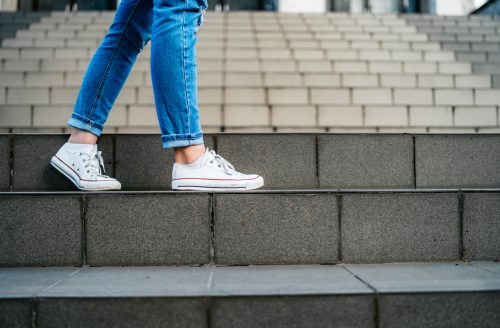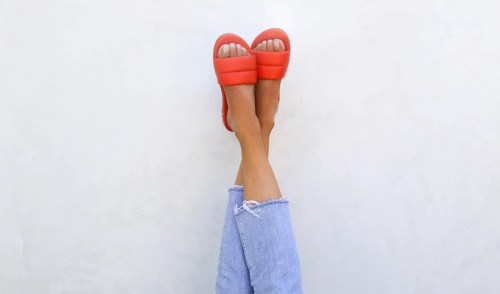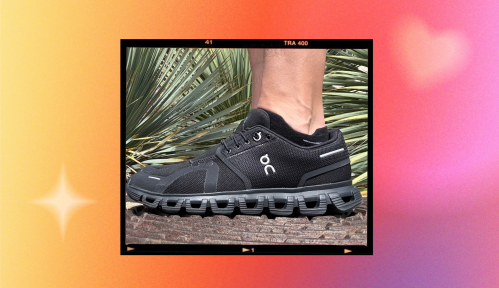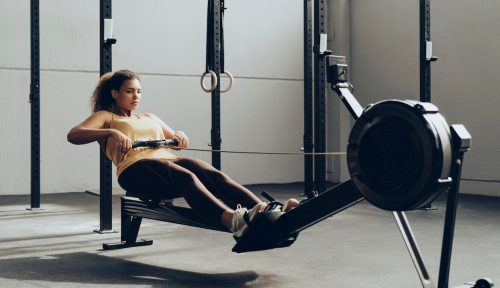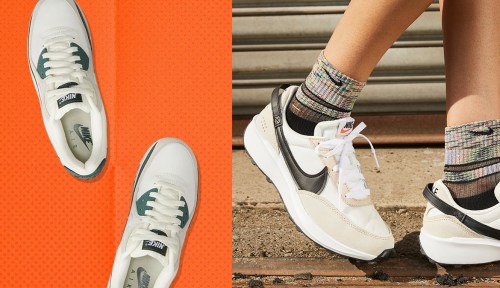Our editors independently select these products. Making a purchase through our links may earn Well+Good a commission
While nothing is sexier than talking about podiatry (she says, sarcastically), you have to admit that being able to walk/run/climb comfortably, for the entirety of your life, is pretty damn hot. All the years spent teetering around on 4-inch heels in pre-COVID times didn’t do your future feet any favors, nor will they whenever we all hit the dance floor in the pandemic’s aftermath for our modern-day version of the Roaring Twenties. And while no one expects you to give up toe-squishing styles entirely, it makes sense to put some thought into all the other types of shoes you’re wearing on the regular to try to help cancel out the damage done by stilettoed boogie nights.
Experts in This Article
podiatrist and member of the Vionic Innovation Lab
board-certified podiatric surgeon and founder of Gotham Footcare
spokesperson for the American Podiatric Medical Association (APMA) and doctor with the Foot and Ankle Specialists of the Mid-Atlantic
podiatrist at Premier Podiatry
The shoes you work out in are obviously of the utmost importance, and should be selected based on your foot type. But the structure of all the other things you slip onto your feet—even slippers!—matters, too. Below, find the complete guide to buying the best shoes for every occasion in terms of both style and substance.
The podiatrist’s complete guide to selecting shoes that support the health and longevity of your feet (an erotic tale)
Running shoes for people with high arches
If your feet have high arches, you need to look for shoes that provide extra cushioning to help with shock absorption. The best, says Miguel Cunha, DPM, a board-certified podiatrist with Gotham Footcare, will have soles that don’t look as though they have any arch, because the arch area will be filled with extra padding. If you’re a runner, Dr. Cunha advises looking for shoes with extra rubber in the soles. If you’re cross-training, on the other hand, he says it makes sense to look for a shoe that has flexible grooves. Either way, the shoe will work best for your arch if it’s also got a roomy toe box and a wide heel.
HOKA ONE ONE Clifton 7 Running Shoes, $130
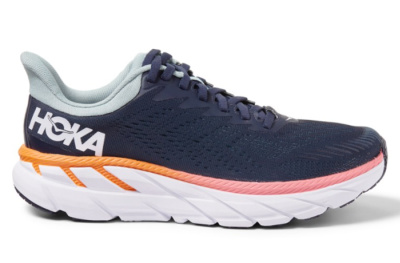
Shop now: HOKA ONE ONE Clifton 7 Running Shoes, $130
Running shoes for people with flat feet
If your feet are flat, you’ll want to compensate for this by looking for shoes that have a thick, supportive arch that will keep your own arches from collapsing. The best bet, says Dr. Cunha, is a pair of motion-control or high-stability sneakers. If you’re a runner, his advice is to find a pair equipped with stabilizing roll bars. If you’re cross-training, he prefers prioritizing a wide toe box instead.
ASICS Gel Nimbus 21, $150
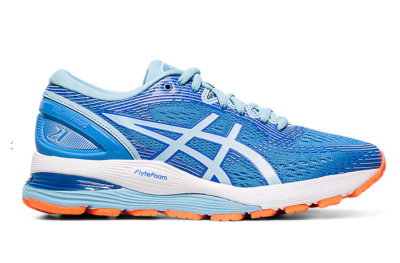
Shop now: ASICS Gel Nimbus 21, Originally $150, On sale for $80
Running shoes for knee support
Knee pain is a common consequence of regular running. You not only want to avoid it because, well, it hurts, but also because it can lead to a debilitating long-term injury. To do so, podiatrist Jacqueline Sutera, DPM, a Vionic Innovation Lab member, recommends looking for shoes that are well-cushioned to help guide the foot in its gait. They should simultaneously be flexible and lightweight as well. “Supporting your feet helps to properly align the ankles, knees, hips, and back,” Dr. Sutera says. “A common cause of knee pain comes from “runner’s foot”—which is caused by overpronation [where your foot rolls inward when you run]. Wearing the proper shoes can minimize the problem and help prevent injury.”
HOKA ONE ONE Bondi 6 Running Shoe, $204
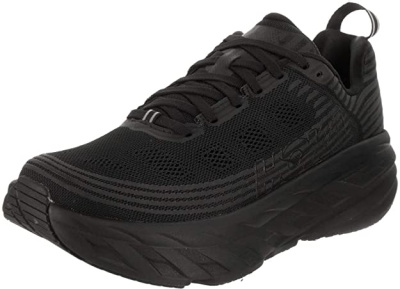
Shop now: HOKA ONE ONE Bondi 6 Running Shoe, $204
Winter boots
Winter boots need to be warm and weather-resistant, but they also need to be supportive of the feet trudging heavily through the snow/sleet/ice/pandemic. The perfect fit, according to podiatrist Priya Parthasarathy, DPM, includes the following: a wide toe box (round is best); a removable (and therefore, customizable) sole or a thick and cushioned sole; a deep heel cut slightly higher than ankle height to stabilize the foot; and limited flexibility (you shouldn’t be able to bend it in half). Just, you know, a few casual criteria.
The North Face Women’s Yukiona Waterproof Winter Boots, $160
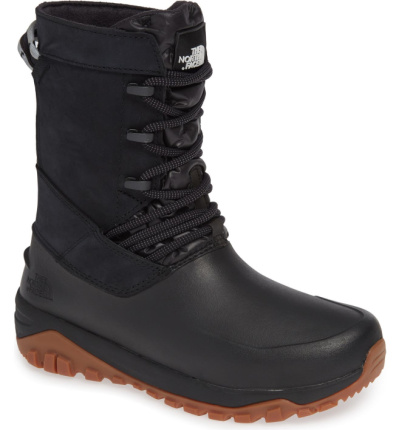
Shop now: The North Face Women’s Yukiona Waterproof Winter Boots, $160
Rain boots
According to Dr. Cunha, rain boots can be deceptively unsupportive. “The majority of them do not offer the proper shock absorption, arch support, or cushioning,” he says. To avoid this pitfall, he recommends applying the bend test to make sure the arch is strong enough to prevent the shoe from bending in half, opting for a boot with a slight heel (around three-quarters of an inch) to help relieve pressure on the Achilles tendon, and a wide toe box so your little piggies can wiggle.
Bogs Neo Classic Rain Boots, $140
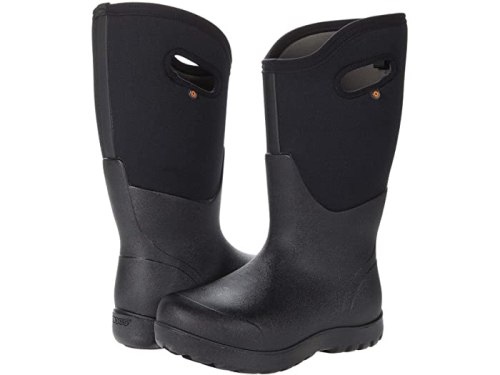

Shop now: Bogs Neo Classic Rain Boots, $140
Slippers
Obviously, the only things you’re actually wearing on your feet right now, aside from the hour or so when you’re pounding the pavement (or pounding whatever square footage you’ve set up for your home gym), are slippers. Even though it may feel as though these are your relaxing shoes, and they should therefore be allowed to lack any discernible structure, that is technically not true. According to Velimir Petkov, DPM, a podiatrist at Premier Podiatry, arch support is non-negotiable, even when it comes to your house shoes. “Good slippers should have soft, insulating, and comforting uppers so that a person can comfortably slip into them without worrying about the width or height of their foot,” he says.
And actually, the pros say that it’s better to wear a supportive slipper than it is to go barefoot, even in your own home. Apparently, this slows the wearing down of your heel pad, which I didn’t know was a thing that happened as you age, but of which I am now appropriately terrified.
Sollbeam Fuzzy House Slippers, $40
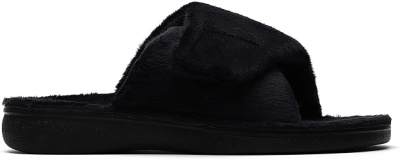
Shop now: Sollbeam Fuzzy House Slippers, $40
Daytime slides
Not that most of us are breaking out our flip flops right now, but in case you were tempted… don’t. According to Dr. Cunha, they aren’t great for your feet, and you should opt for a (slightly chicer) slide instead. “Summer slide shoes are somewhat similar to a surgical shoe as they have a harder sole than most traditional sandals or flip flops and can accommodate more uneven and hard terrain which, of course, can help minimize injury,” he says. It’s best if the slide isn’t completely flat; look for shoes that have a three-quarter-inch wedge if possible.
Birkenstock Arizona Big Buckle, $150
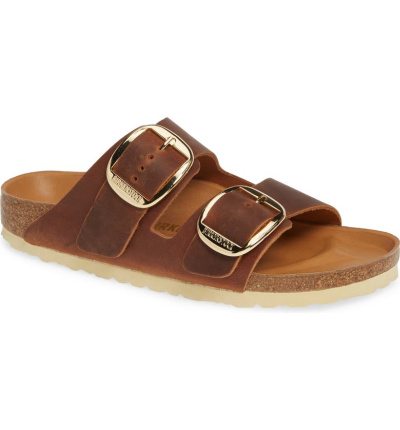

Shop now:Birkenstock Arizona Big Buckle, $150
Shoe inserts
While we’re here, we might as well talk about what you can put into the shoes you already own that don’t quite meet the above-described criteria to make them better for the overall health of your feet: inserts. They work by—you guessed it—supporting your arches, as well as by stabilizing your mid-foot joints. No surprise here, but Dr. Petkov prefers custom inserts to over-the-counter varieties. Fortunately, there are kits you can use at home to achieve this personalized effect. Some can even be worn with high heels, which actually could be sexy? Especially since it might prevent you from being that girl walking shoeless on a dirty street at the end of the night, right? TBD, but post-pandemic times can’t come fast enough.
Hammacher Schlemmer The Custom Fit Insoles, $120
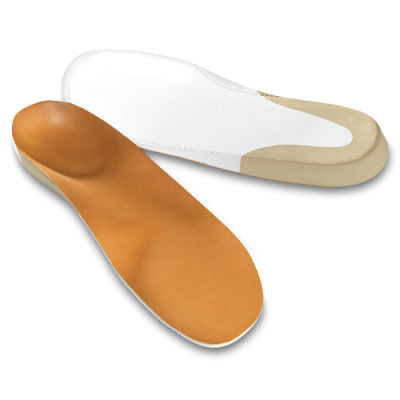
Shop now: Hammacher Schlemmer The Custom Fit Insoles, $120
Sign up for the Well+Good SHOP Newsletter
Get exclusive deals on wellness, beauty, fitness, and food products that have been hand-picked by our editors.
Got it, you've been added to our email list.
